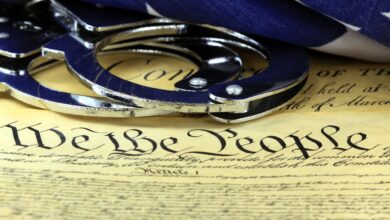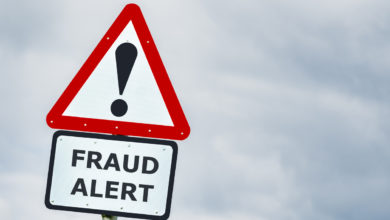The Toxic Good Intentions of Third-Party Candidates

Like most ex-smokers, I made countless attempts to quit before I finally got one to stick. That was decades ago, so I guess I’ve earned the right to put the “ex” before “smoker.”
But before I got there, I spent a lot of time nurturing meaningless good intentions. I remember once telling a friend about my umpteenth failed attempt to quit smoking. He gazed at the Marlboro dangling from my lips, tilted his head toward a mound of butts smoked down to the filter, and deadpanned: “Congratulations. You now have a whole ashtray full of good intentions.”
Good intentions are a mixed blessing. Sometimes they lead to putting the “ex” in front of some bad habit. But sometimes all they get you is an ashtray overflowing with cigarette butts.
And sometimes good intentions get you a whole mountain of garbage, like a calamitous war that sets the entire world on fire and, God help us, Donald Trump.
Three righteous men of unimpeachable integrity and only the best of intentions have in recent years visited hell on our nation. Ralph Nader’s third-party candidacy in the 2000 presidential election brought us the election of George W. Bush and, in turn, the invasion of Iraq and the reign of terrorism that followed it. James Comey delivered Donald Trump to the Oval Office and Robert Mueller kept him there.
Not despite their good intentions, but because of them.
(Yes, I know that dozens of sophisticated causation models can be massaged to cough up a multitude of factors leading to the election of George W. Bush in 2000 and the election of Donald Trump in 2016. But I also know that even discounting all of those factors, Al Gore almost certainly would have won the 2000 election but for Nader’s third-party candidacy, and Donald Trump likely would not have been elected in 2016 but for James Comey’s unconscionable kneecapping of Hillary Clinton days before the election.
No Nader, no W, no invasion of Iraq. No Comey, no Trump. That’s more than enough causation for me.)
The good intentions that led Nader to throw his hat into the presidential ring in 2000, taken at face value, were unimpeachable. He was going to save us from nothing less than “a crisis of democracy.” His announcement of his candidacy for the Green Party’s nomination for president in 2000 promised to deliver the nation from “grave and growing societal problems in health care, education, labor, energy and the environment.” He didn’t quite declare that “only I can save us,” but he came close: as a citizen advocate, he had “no other choice but to close the democracy gap by political means.” He could “no longer watch.” It was “necessary” for him to launch a sustained effort “to wrest control of our democracy from the corporate government and restore it to the political government under the control of citizens.”
Who could argue with that?
Comey clothed his impact on the 2020 election in similarly righteous intentions. He appears, to this day, to believe that did the right thing when he torpedoed Hillary Clinton’s bid for the presidency. One need look no further than the title of his book, “A Higher Loyalty,” to get the point. Comey tells us that given the chance to do it all over again, he would. He would still kill Hillary Clinton’s election by announcing, just days before the election, that he had reopened the email case against her – even though at the time he didn’t know whether there was any new relevant information against her (there wasn’t, it turned out), and even though he knew that he had delivered a serious, probably fatal blow to her election prospects.
Why?
For only the most high-minded reasons: “The American people needed and deserved transparency.” He would bravely “take the hits” to protect the public trust in the FBI. He had only two choices, according to his testimony to the Senate Judiciary Committee in 2017: “speak” or “conceal.” While speaking would be “bad,” an “act of concealment” would be “catastrophic.”
What could be more well-intentioned than that?
While James Comey put Donald Trump in the Oval Office, Robert Mueller kept him there. For only the most high-minded reasons, of course.
Mueller’s prosecutorial decision not to indict Trump for obstruction of justice was based on DOJ guidelines prohibiting indictment of a sitting president, not on a lack of evidence. Fair enough.
But his decision not to affirmatively state the obvious – that there was more than sufficient evidence to support a criminal charge after Trump left office, or to support the launch of an impeachment process – gave Trump and his compliant attorney general Bill Barr the opening they needed to declare case closed.
Why did Mueller decline to close the loop by articulating a prosecutorial decision on Trump’s obstruction of justice? It wasn’t because he lacked sufficient evidence or was otherwise unable to do so. It was because it wouldn’t be “fair.” A conclusion that “crimes were committed, but that no charges will be brought” would deprive Donald Trump – the single person in the entire world with the largest public megaphone – of the opportunity for “public name-clearing.”
What nonsense. Mueller seems to have been more interested in burnishing his own holier-than-thou image than in calling out a crime by its name.
The lesson of the Nader, Comey and Mueller fiascos is that it is the consequences of actions taken by individuals, not their intentions, that shape nations and lives for better or worse.
The ‘Great Man’ theory of history teaches that history is made by individuals who did not become important historical players merely by chance, but by dint of possessing uncommon traits of character not often found in the rest of us.
But here’s the rub: “Great,” as used in this theory, is a morally neutral term that can include both heroic and unspeakably villainous individuals. It is a measure of volume, not virtue. Donald Trump probably fits just as comfortably into the great man theory of history as does Winston Churchill. So does Hitler.
And “great” is largely in the eye of the beholder. When the beholder is the would-be “great” man himself, watch out.
One needn’t gaze too far over the horizon to see a new cohort of self-proclaimed great men slouching toward Washington D.C., all under the banner of righteousness, and all poised to do catastrophic damage in its name.
The centrist political organization No Labels positions itself as the voice of “America’s commonsense majority.” Its plan to gain ballot access across America for a third-party candidate in 2024 isn’t anything as mundane as a presidential campaign, it’s a far loftier “presidential insurance project.” Victory is virtually assured: “No Labels’ ballot line will give America’s commonsense majority the option to propel that ticket to the White House.”
Just get a whiff of the benighted smugness coming from Joe Cunningham, the national director of No Labels. According to an op-ed written by Cunningham, it would be nothing less than a “moral failure” for the Democratic party to nominate the sitting president, Joe Biden, for re-election in 2024.
Why? Because of a “stunning” recent ABC News-Washington Post poll that showed Trump winning against Biden by 7 points in a general election matchup. This single outlier poll “should prompt serious and urgent soul searching.”
And what is to be done once all of this soul searching has brought us to our senses? Why, of course, get a third-party candidate on the ballot in all 50 states! This effort, to be “led by [Cunningham’s] organization No Labels,” will close the path to victory for Donald Trump.
Got it? The No Labels third-party ticket will win because it is a “better choice!” The irrational fear that a moderate “unity ticket” will draw enough votes from Biden to assure Trump’s election “crumbles” in light of the ABC News-Washington Post poll. Indeed, because Trump typically runs ahead of the polling, he’s likely to beat Biden by even more than 7 points.
Really, what planet does this guy live on? Planet Nader? Planet Stein? Planet Perot, Andersen, Wallace or Thurmond?
Or take Robert F. Kennedy Jr. . . . please. (Sorry about that – it was just too tempting) Kennedy announced in April that he would challenge President Biden for the Democratic nomination in 2024. Aside from building his candidacy around weird anti-vax conspiracy theories, Kennedy is wrapping himself in the warm historical legacy of his father and his uncle, John F. Kennedy. He says he’s going to save us from government that too often looks like “Hitler’s Germany.” He tells us, no doubt more in sorrow than in anger, that he’s made a “difficult choice to put my principles ahead of my personal affections.” What a guy!
The Bulwark’s Jonathan V. Last views RFK Jr. as “a Fifth Column inside the Democratic coalition,” a “stalking horse for the parts of MAGA that are not yet fully in the Republican coalition.” At between 12 percent and 20 percent, RFK’s numbers are real enough to possibly “lead a bunch of conspiracy-minded progs into the Republican coalition.”
Then there’s former Harvard and Princeton professor Cornell West. West is nothing if not righteous. His Cornell West For President website informs us that he’s “running for truth and justice” as a Green Party candidate in the 2024 election. He’s going to end war, forgive student debt, expand Social Security and usher in a paradise of clean energy.
No Labels, RFK, Cornell West, and all of the other announced and potential third-party candidates have three things in common: (1) they are not merely well-intentioned and righteous, they have positioned themselves as saviors of democracy and the American way of life; (2) they can’t win; and (3) the most likely result of their efforts, if they have even a modicum of success, will be the election of Donald Trump as president in 2024.
That’s because Donald Trump is going to need a little help from his enemies to win the 2024 presidential election, and thereby hopefully to stay out of jail.
That’s not to say that Trump has no chance to win the Republican nomination and then go on to defeat Biden in a head-to-head race. He does, but while the nomination is well within his grasp, winning the general election looks like a steep uphill climb based on the majority of the polls, his loss to Biden in 2020, the poor performance of his endorsed candidates in the 2022 midterms, the constant drip of his civil and criminal exposure, his increasingly unhinged public behavior, and the perception among many, including some of his supporters, that he’s unelectable.
Luckily for Trump, however, help is on the way.
The “dangerous illusion” of a third-party presidential candidacy may be all the help he needs. It is coming not from larger-than-life figures who have cast big shadows on the American political landscape, but from bit players, moderately accomplished but not “great” men and women of good intentions.
People just like Ralph Nader, James Comey, and Robert Mueller.





Great column, Philip. This cannot be said often enough:
“But his decision not to affirmatively state the obvious – that there was more than sufficient evidence to support a criminal charge after Trump left office, or to support the launch of an impeachment process – gave Trump and his compliant attorney general Bill Barr the opening they needed to declare case closed.”
Brilliant. Thanks for putting this together.